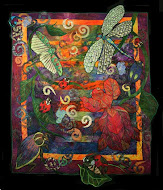Saturday, January 16, 2010
Thread Savy- Mono-filament Threads
Mono-filament threads are a whole other class. They are an embroidery thread of a sort.They are a war horse thread with specific purposes. But they do not really work for any classic dense embroidery.
Why?
Because they are so strong. In general, threads that are made of one particular thing are stronger than threads made of several substances twisted together. Metallic threads are always weaker than single fiber threads, because they're really not all of one piece. It's lurex, viscose, poly, and often a partridge and a pear tree. Metallics are not only a test tube baby. They are hybrids.Mono threads are one single substance that is stronger than the cotton threads of your fabric. Which means it can, if misused, cut through your surface fabric. So some caution and information is a real help here.
Early mono-filament nylon:
In the seventies, when we had the beginning of of knitted fabrics and sewing for knits, mono-filament came to the fore for lingerie and stretch knits. It was almost like a cord. It also melted easily with an iron.You could iron your garment and watch the seams separate. It was a heavier weight thread at around #20, which made it way too strong. It was wonderful for hanging sun catchers and that was it's very best use.Lots of the bad stories about mono-filament thread are in response to those original ones.This was the mono filament nylon they said could hurt your machine. It could. It came in giant cones. If you still have any of this left, use it for hanging pictures or make some mobiles. Please don't sew with it.
Mono-filament now:
We've come a long way.Because of the intense strength of these threads, it's recognized that they should be usually 40-70 weight (remember that larger numbers are thinner threads). They're perfectly safe for machines, both in the needle and bobbin.They also come in polyester and in nylon. The polyester ones are also available in colors.
If they aren't in colors, they'll come in clear and smoke. Clear is for white and pastel work. Smoke is for anything darker. Withing those formats, it really is invisible.
They shine as stippling threads. They work very well in both contemporary work and in traditional machine quilting looks. They are much safer for your surface fiber if they're done with a straight stitch.
You may be tempted to use the colored ones for zigzag embroidery. Don't. They're #70 which means they won't fill in well. And they will cut through your top fabric.
I do use mono-filament as an appliqué thread and for couching, with a zigzag stitch. But in both cases I never stitch densely. I stitch just enough to attach everything. Dense zigzag stitching with mono-filament will cut through your surface fabric, even now. But I haven't had one of the newer mono-filaments melt ever. They've licked that problem.
I also use them as a major part of bias application. If you check out my book, Quick and Easy Machine Binding Techniques, you'll see it used to sew down the top edge of bias tape. I'm not sewing those puppies by hand.
Wrapping it up
Mono-filament threads are brilliant for sewing things down invisibly, for stippling, and for straight stitching. They can be used zigzag, but with caution. And as always, garbage in, garbage out. You can't afford cheap threads.
Quick and Easy Machine Binding Techniques is available on my site at
http://www.ellenanneeddy.com/store-detail.php?cat=1&ID=3.
Subscribe to:
Post Comments (Atom)
Dragonfly
Essential Embroidery Stitches
My Blog List
-
Moving Day13 years ago
-
Getting Together14 years ago
-
Getting Together14 years ago
Facebook Badge
My Blog List
-
TIME49 minutes ago
-
Past Glory3 days ago
-
Christmas Luncheon1 week ago
-
Husky Has Holiday Tip4 weeks ago
-
2021 Calendar4 years ago
-
A Change is Coming….5 years ago
-
GOrillas! on the Move!6 years ago
-
finish line in sight6 years ago
-
Easton Walled Garden6 years ago
-
-
Winsor Newton Pigment Marker Review8 years ago
-
gelliprint met gedicht8 years ago
-
Casey's T-shirt Quilt8 years ago
-
-
The San Salvador Sails By ...9 years ago
-
-
Construction Zone 10110 years ago
-
What a summer....so far11 years ago
-
Revealing BSBP 8....11 years ago
-
So this is Week 7?11 years ago
-
The last cloth doll making cruise12 years ago
-
-
Fall journey13 years ago
-
I've Moved...My blog That Is!13 years ago
-
This Blog has Moved....13 years ago
-
QUILTVERSE HAS BEEN REVIEWED!13 years ago
-
-
-
Quilt Teacher Blog Ring
SAQA ARTISTS RING
Networked Blogs
Followers








2 comments:
Thanks for doing this! You obviously put a lot of thought into your entries and I appreciate it.
Hello Ellen Anne,
I am enjoying the new informative posts very much!
Best Wishes for a HAPPY day,
DianeL
Post a Comment